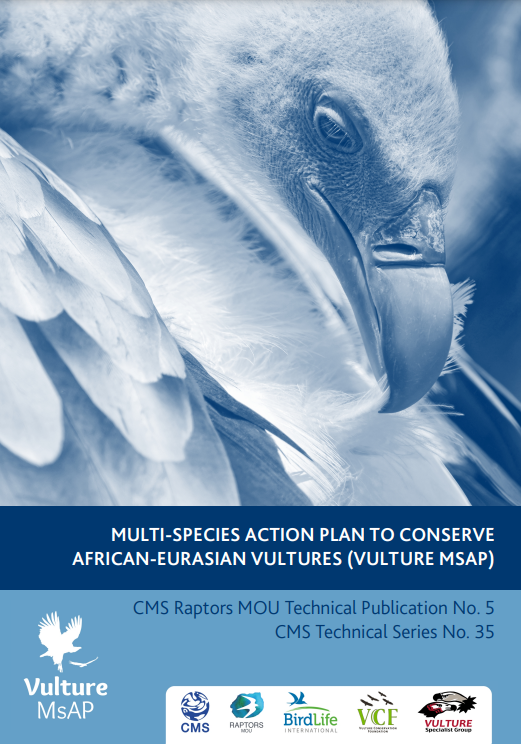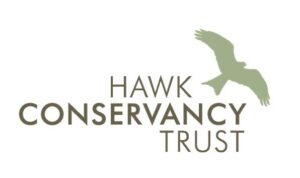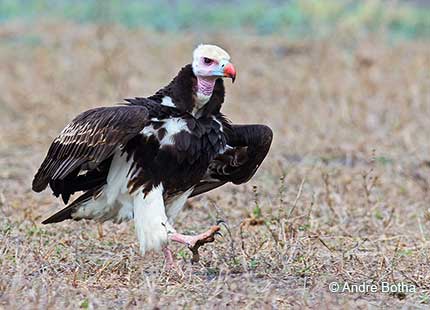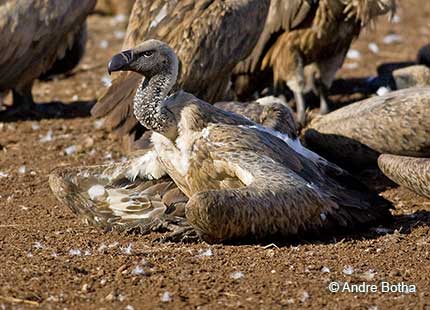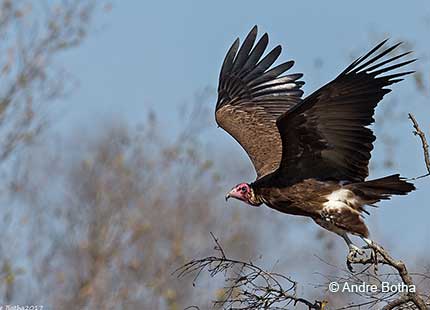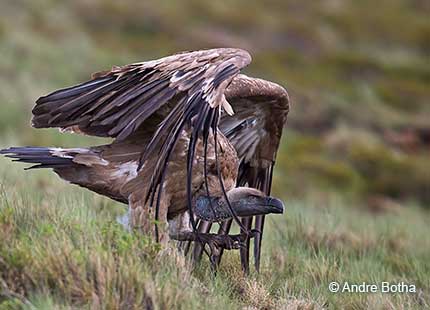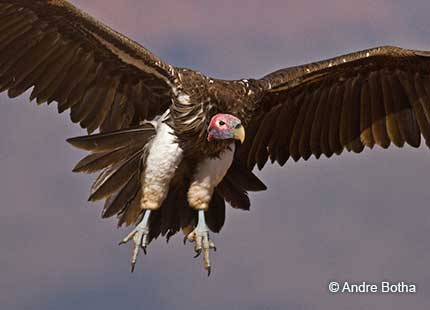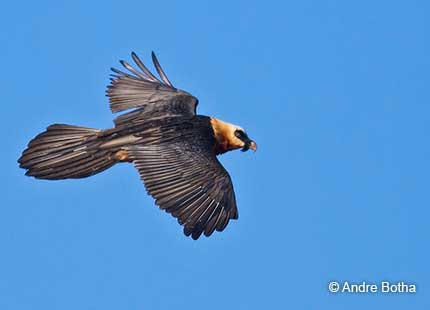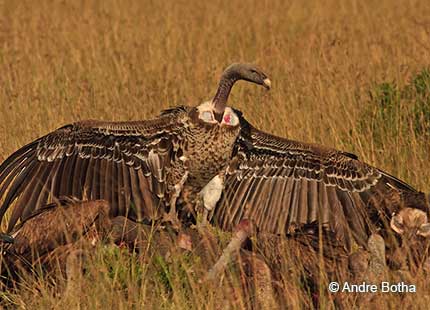vultures
for africa
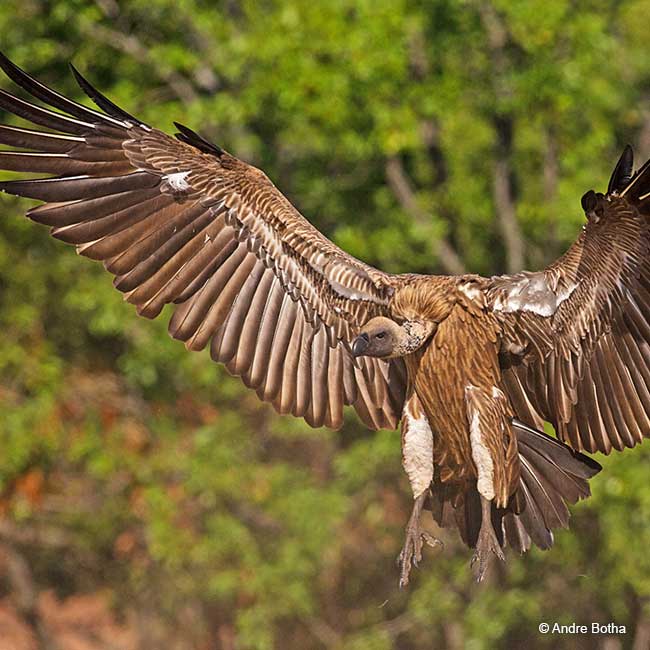
Saving vultures
What are vultures?
Vultures are large birds of prey that are obligatory scavengers, meaning they mostly eat dead animals as a food source. Vultures play a very important hygienic role in cleaning up ecosystems. Removing dead animals from the environment by feeding on them reduces the risk of diseases that may spread to other species.
7
species
17
countries
6,5k
people trained
Threats To Africa’s vultures
The biggest threat to Africa’s vultures is poisoning. These birds have declined drastically over the last 30 years, and four of the 11 species are now Critically Endangered. As scavengers, vultures are extremely vulnerable to poisoning, particularly at carcasses laced with lethal pesticides. Sometimes they are not the intended targets but are victims of secondary poisoning when they eat a poisoned animal targeted due to human-wildlife conflict or for other reasons. Hundreds of vultures often eat from the same carcass, so one animal can kill all these birds and other scavenging animals. In Africa, vultures are also deliberately poisoned by poachers to prevent the birds from alerting authorities to poachers’ illegal activities when they circle over recent kills. They are also poisoned for the harvesting and selling of their body parts for belief-based use. Other known threats to vultures include collisions with and electrocutions on energy infrastructure, reduced available food sources, fragmentation, loss of breeding and foraging habitat, and disturbance.

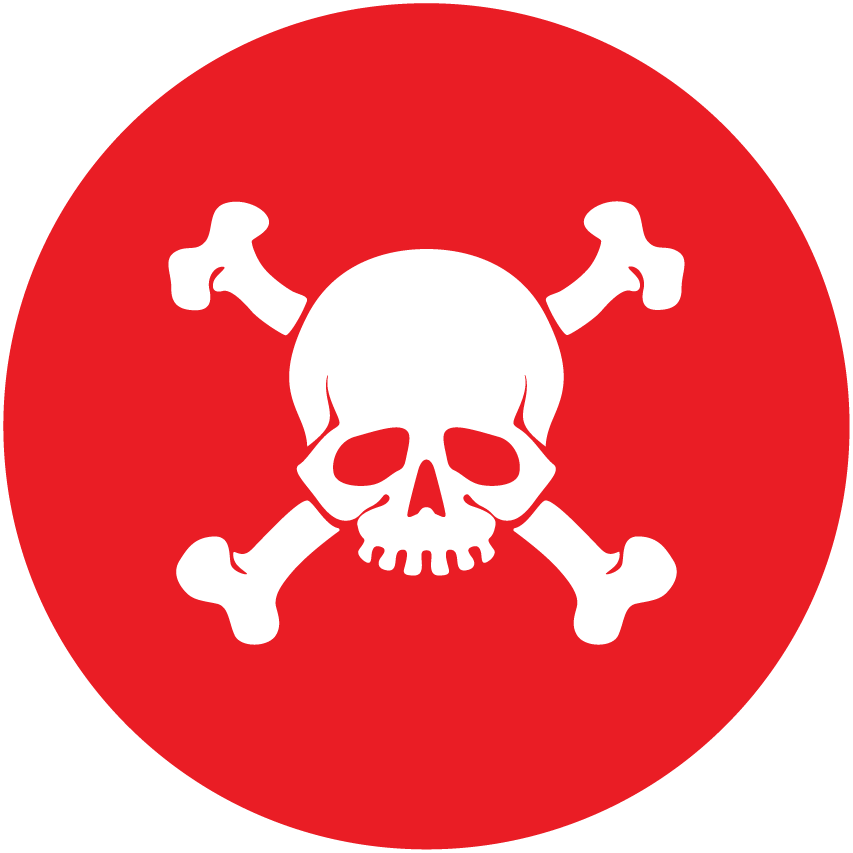
Hawk Conservancy Trust
The Vultures for Africa Programme has been working closely with the Hawk Conservancy Trust, a raptor conservation NGO based near Andover in the United Kingdom, for more than a decade. Together, we have focused on assessing vulture breeding populations in the Kruger National Park (2011-2015 and 2020-2023). We have also partnered on the development and implementation of the Wildlife Poisoning Response training initiative that has, to date, reached more than 7,000 learners from the conservation, law enforcement and veterinary communities in 19 African countries since 2017. The Hawk Conservancy Trust continues to contribute financially, and in terms of capacity, in support of the work of the Vultures for Africa Programme. The EWT appreciates their substantial contribution over many years.
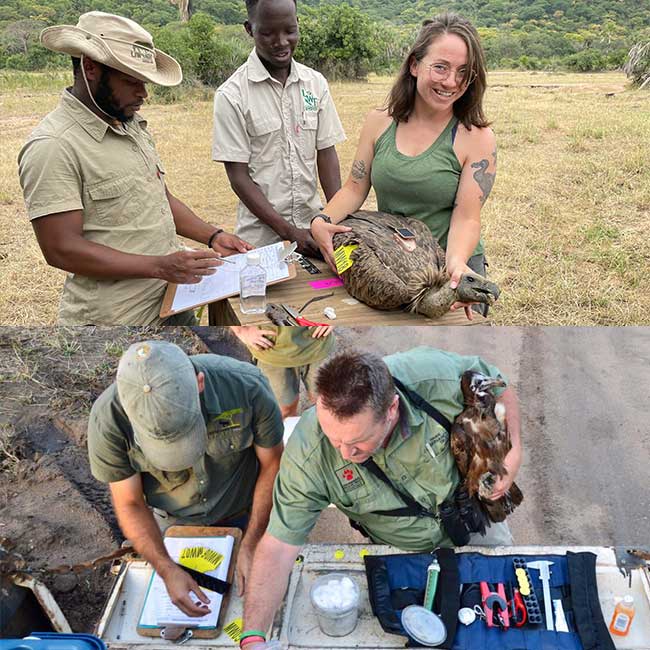
our focal Vulture species
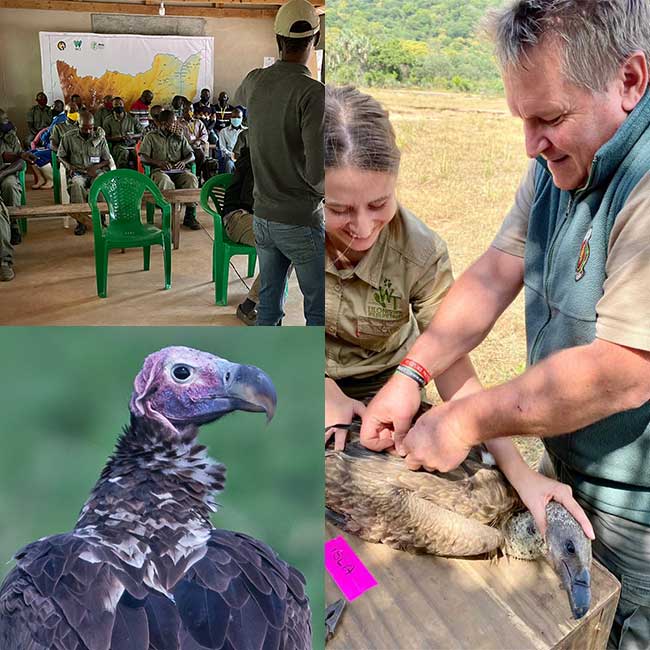
How we save vultures
The EWT’s Vultures for Africa Programme implements specific actions identified in the Convention on the Conservation of Migratory Species (CMS) Vulture Multi-species Action Plan (MsAP). Our work includes activities that address this most significant threat to Africa’s vultures and a range of other wildlife species through the following activities:
- Wildlife Poisoning Response and Prevention training
- Managing the African Wildlife Poisoning Database with partners to capture and collate information on all known wildlife poisoning incidents across the continent.
- Creating greater awareness of vultures and their plight
- Establishing research and monitoring activities for vultures to fill knowledge gaps across the African continent
- Engaging governments and other high-level stakeholders to implement actions that benefit vultures
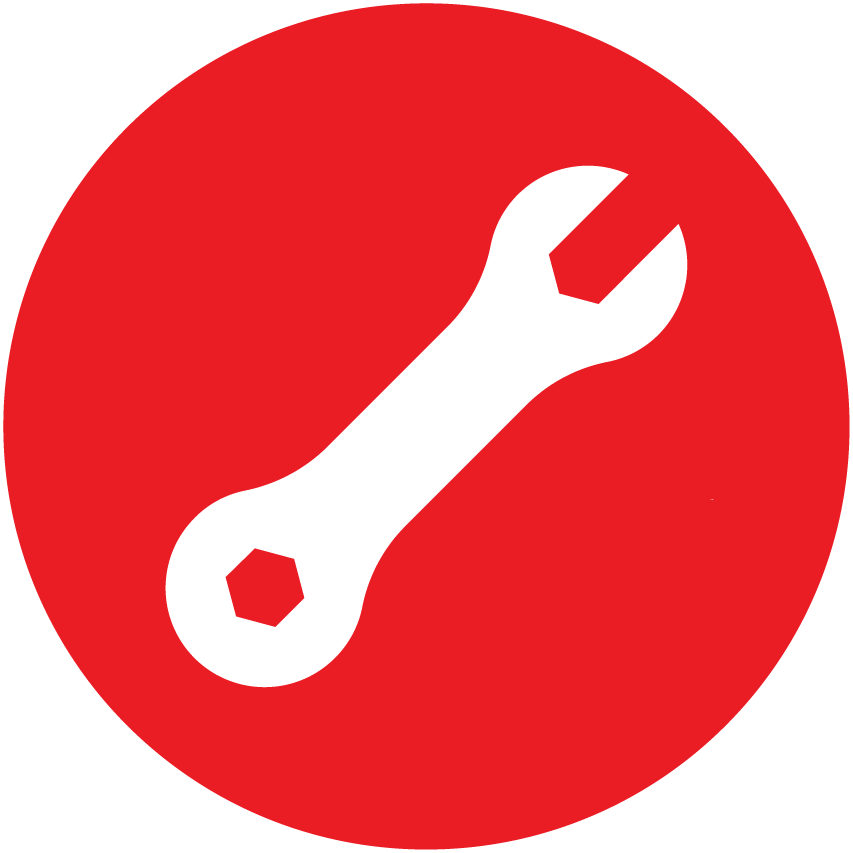


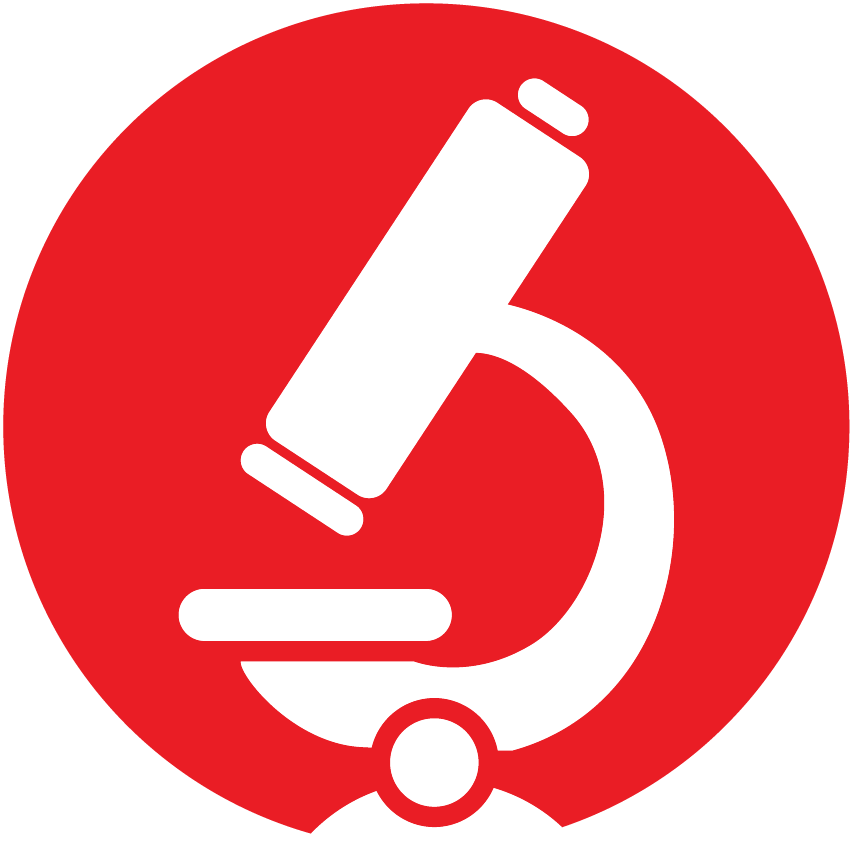
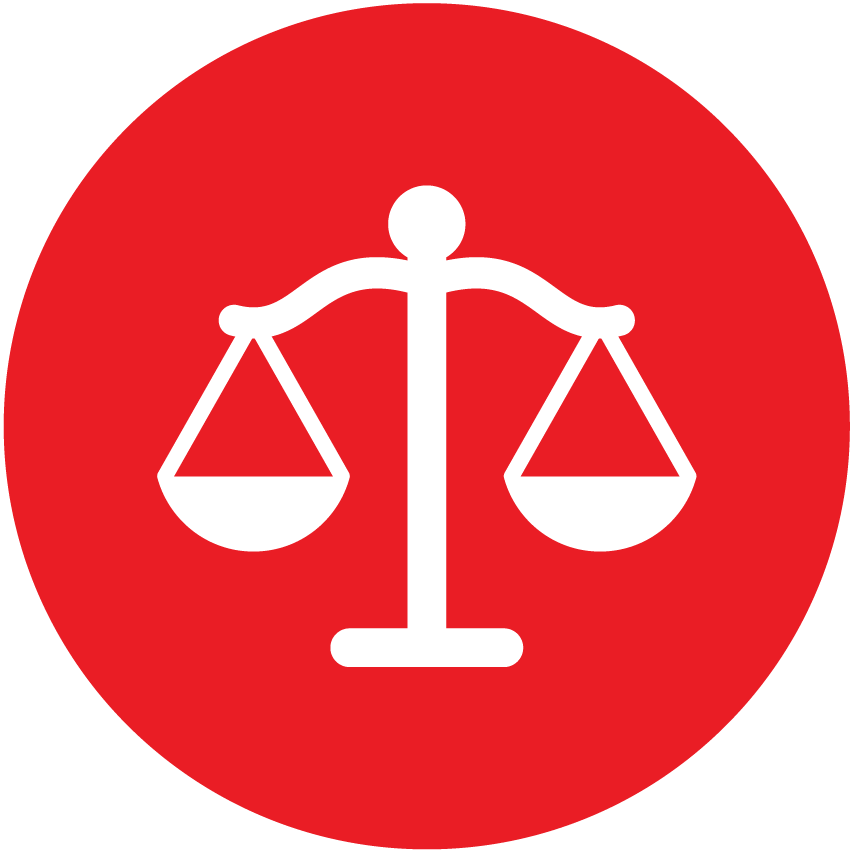

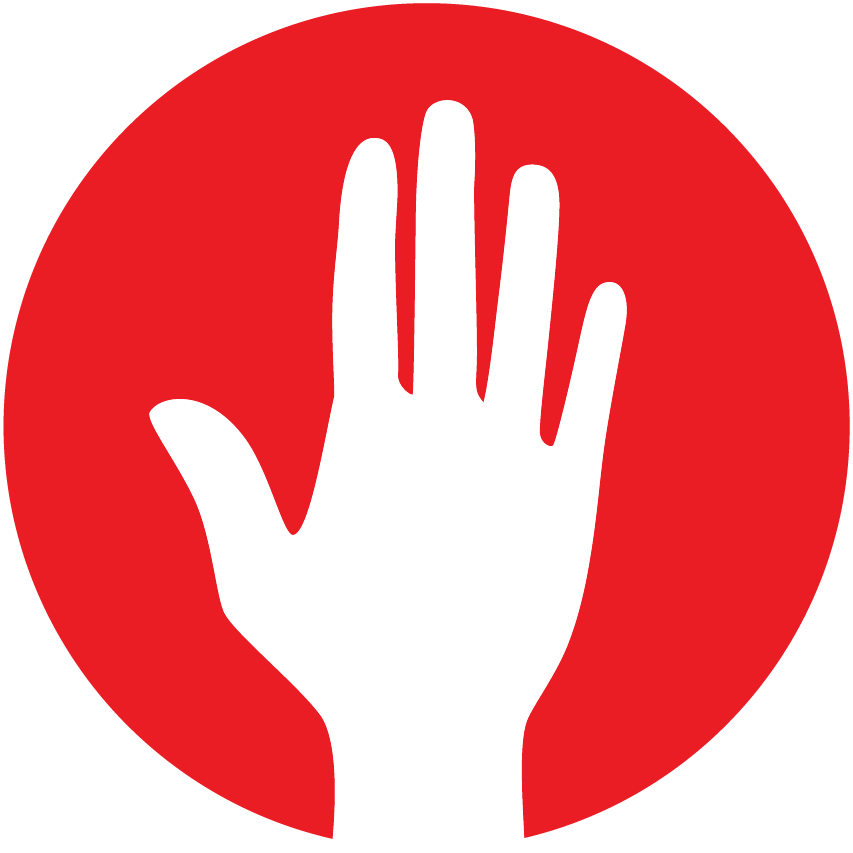

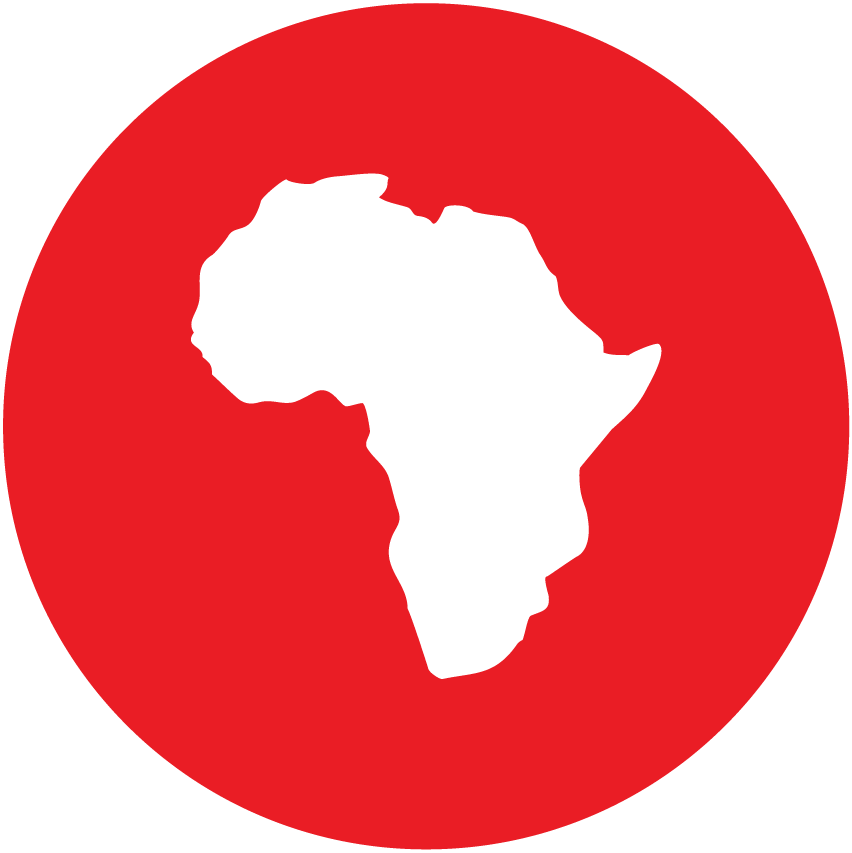
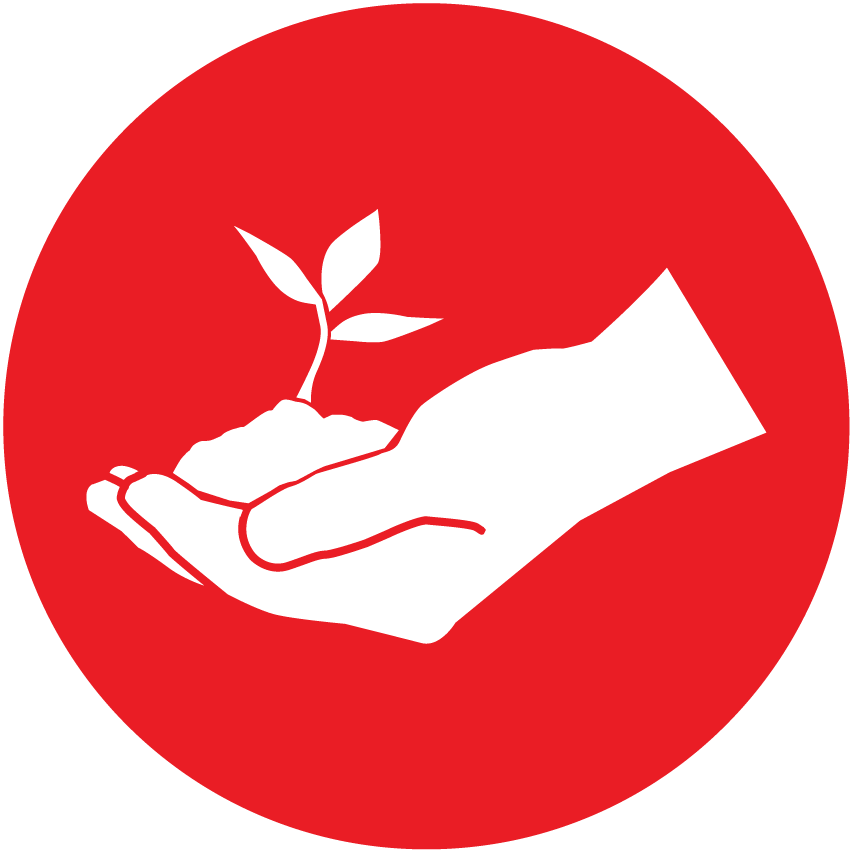
Stories of Success
for vultures
Wildlife Poisoning Response Training
To date, we have trained more than 6,500 people in 17 countries in sub-saharan Africa to respond to and manage wildlife poisoning incidents. By training trainers in various countries within the SADC region and Kenya, we have increased training capacity and seen the adoption of at least nine response plans in known poisoning hotspot areas. We have also produced a Wildlife Poisoning Response Protocol that is available in English and Portuguese and is issued to all trainees.
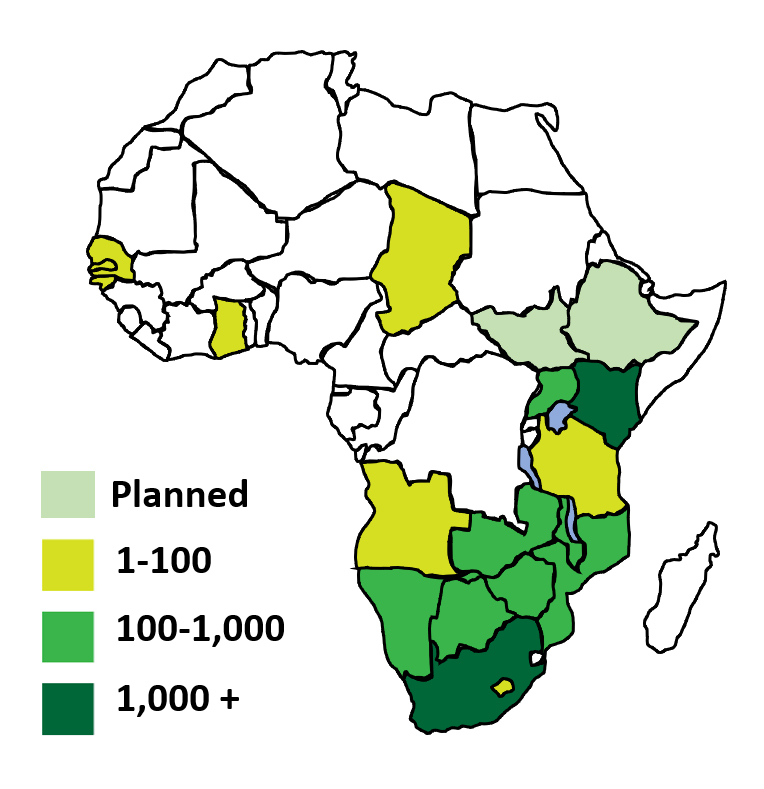
International Vulture Awareness Day
Held on the first Saturday in September, the EWT established this international day of celebration and more than 100 organisations from 43 countries now participate in this annual event to reflect on the importance of vultures and the essential role they play in maintaining healthy ecosystems.
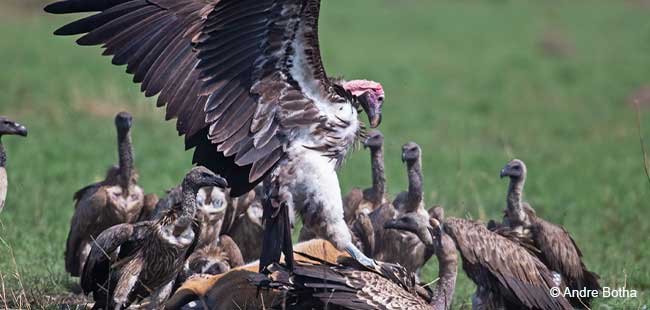
How you can help Vultures
African vultures, now more than ever, need us all to work together, focusing our efforts across their range to halt and reverse population declines. The EWT’s Vultures for Africa Programme needs your support to do this. You can help by:
- Reporting activities and threats that may threaten or impact vultures and their habitats
- Helping us build capacity across Africa to enable African vulture researchers and conservationists to protect the continent’s vultures
- Donating to support this important work
Like you, we would hate to see the African skies without these charismatic birds circling above us, and we are grateful for your support.
Research and monitoring projects
We have worked with in-country partners in seven countries to develop field staff’s capacity to monitor and research vultures and other large birds to fill knowledge gaps. This research will also help us better understand the populations of our target species and how to conserve them. To date, we have assisted in establishing tracking and wing-tagging samples in Mozambique, Zambia, Malawi, Namibia, Botswana and Uganda.
In Mozambique, we have worked with Boise State University in the Gorongosa National Park to establish a tracking sample of more than 40 White-headed, African White-backed, and Hooded vultures since 2017. We also conducted the first aerial survey of vulture nests in the Park in 2018. In June 2022, we partnered with ANAC, WCS Mozambique, the Niassa Carnivore Project, and Chuilexi-concession/Fauna and Flora International to establish the first tracking sample of vultures in the Niassa Special Reserve in northern Mozambique. We will continue to work with staff in this reserve to initiate baseline monitoring of vultures through capacity development and training in the field.
We follow the same approach in Malawi, working with the Lilongwe Wildlife Trust and have established a tracking sample of 12 vultures, with further expansion planned. Likewise, our vulture tracking sample in Zambia, established in partnership with BirdWatch Zambia, Caring for Conservation, and the Zambia Carnivore Programme exceeds 20 birds and will be doubled by the end of September 2022. Working with the Uganda Conservation Foundation and the Uganda Wildlife Authority, we have established a tracking sample of 13 vultures of three species in the Murchison Falls, Queen Elizabeth, and Kidepo National Parks in Uganda. In all these countries, we also train local teams in the safe handling and processing of vultures that are trapped, ringed, and fitted with tracking devices to enable them to work independently in future. We aim to support and develop African conservationists and vulture biologists to take responsibility for conserving the continent’s vultures.
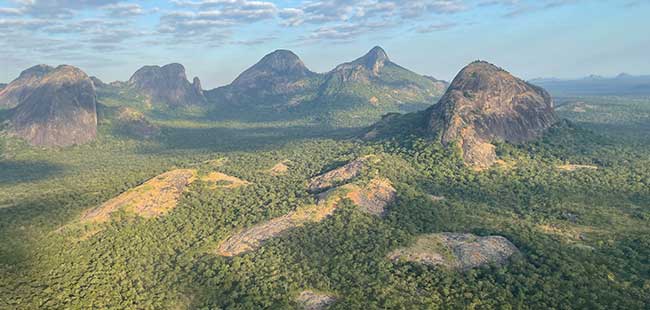
NATIONAL AND INTERNATIONAL HIGH-LEVEL ENGAGEMENT
The programme represents the EWT on the National Vulture Task Force, responsible for developing a National Biodiversity Management Plan for all vulture species in South Africa, the National Wildlife Poisoning Prevention Working Group, and the Lead Task Team. The Department of Forestry, Fisheries, and the Environment (DFFE) leads these initiatives.
We worked with a range of West African partners, BirdLife International and the IUCN Conservation Specialist Group, to draft a strategy to combat the threats to vulture populations in that region. In addition, we continue our work on the Convention on Migratory Species Raptors MoU Technical Advisory Group, Vulture MsAP Working Group, and the CMS Wildlife Poisoning Working Group.
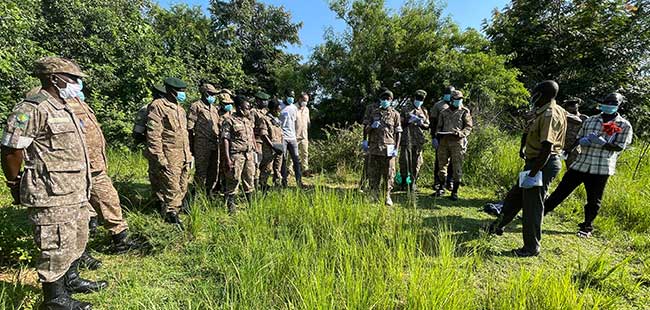
Mid-term implementation review of the CMS Vulture MsAP
In 2023 and the first two months of 2024, the Vultures for Africa Programme lead the review of the Mid-Term Implementation Action Plan to Conserve African-Eurasian Vultures (Vulture MsAP) after the EWT was contracted to lead the process through a Convention on Migratory Species (CMS) Raptors Memorandum of Understanding signed in April 2023. The EWT’s Vultures for Africa Program Manager, Andre Botha was appointed as project leader, and was joined by the EWT’s Jane Doherty, representatives from BirdLife International, the Royal Society for the Protection of Birds and the Vulture Conservation Foundation, supported by the Coordinating Unit of the CMS Raptors MoU. Jane Doherty was appointed as project intern in the employ of the EWT and was invaluable during the engagement with focal points, analysis of data and drafting of the report.
The report on the Mid-Term Implementation Review of the CMS Vulture MsAP was released by Andre Botha at a side event at 14th Conference of Parties to the CMS in Samarkand, Uzbekistan on the 14th of February 2024. The event was attended by about 60 delegates from Range States, Observer Groups, as well as 6 members of the drafting team. The report and its annexes can be accessed on the CMS Raptors MoU website.
Among its key findings are that although the threats affecting vultures have not changed in recent years, problems related to intentional poisoning for belief-based use, bushmeat and trade is a more severe problem than appreciated in the past, especially in West Africa. It also found that collision risk for vultures will increase as the global shift to renewable energy increases and that mortalities from electrocution partly associated the switch to green energy is also on the rise. Among the new threats identified are climate change and Highly Pathogenic Avian Influenza, which can critically impact critically endangered and endangered species already under pressure from other known threats. Although some vulture populations are increasing in Europe, many are declining at a precipitous rate in Africa where data remains scant.
The report states that the amount of work done towards achieving the Results envisaged by the Vulture MsAP is testament to the efforts of many stakeholders, including the many NGOs, such as the EWT, working in the field.
The main recommendations emerging for Range States, donors and other stakeholders from this report are:
1. Strengthen political engagement and financial support
2. Build capacity to implement conservation actions
3. Focus on the implementation of essential actions
4. Enable the establishment of the Implementation Framework proposed by the Vulture MsAP
5. Continue facilitating the Vulture Working Group and monitoring the Vulture MsAP
6. Commence the review and update of the CMS Vulture MsAP – 2028/2029
The MsAP was adopted at the CMS CoP12 and is now halfway through its 12-year implementation timeframe. It is set to conclude in 2029.
